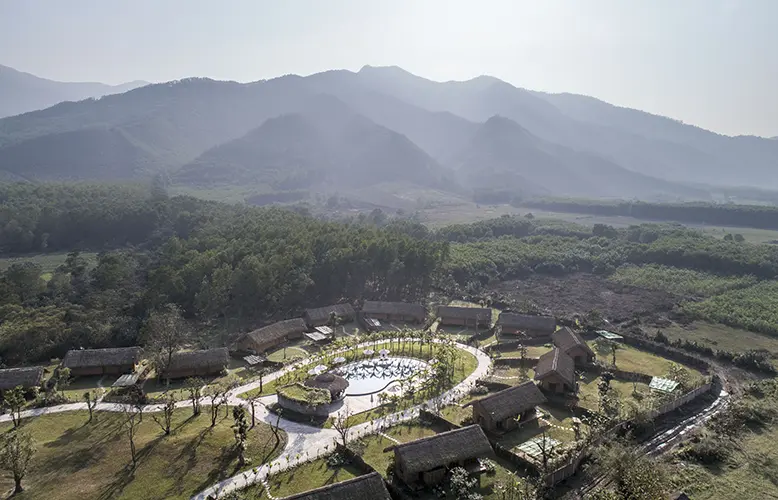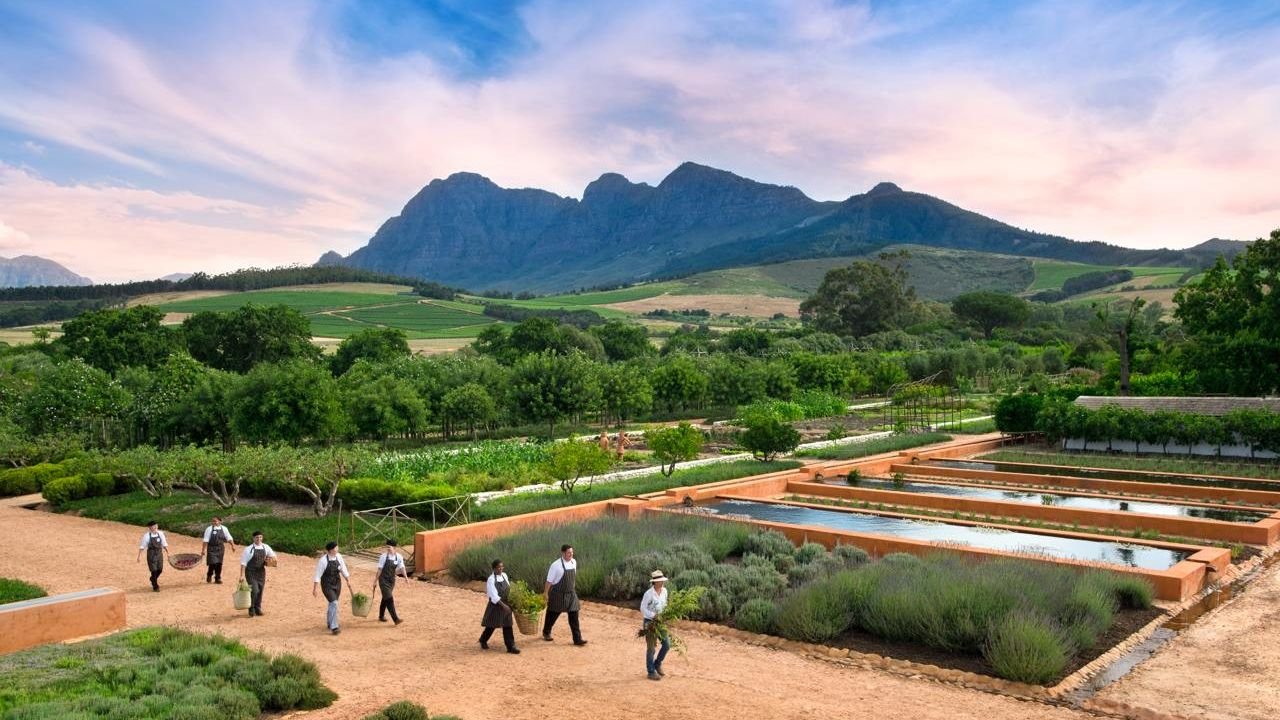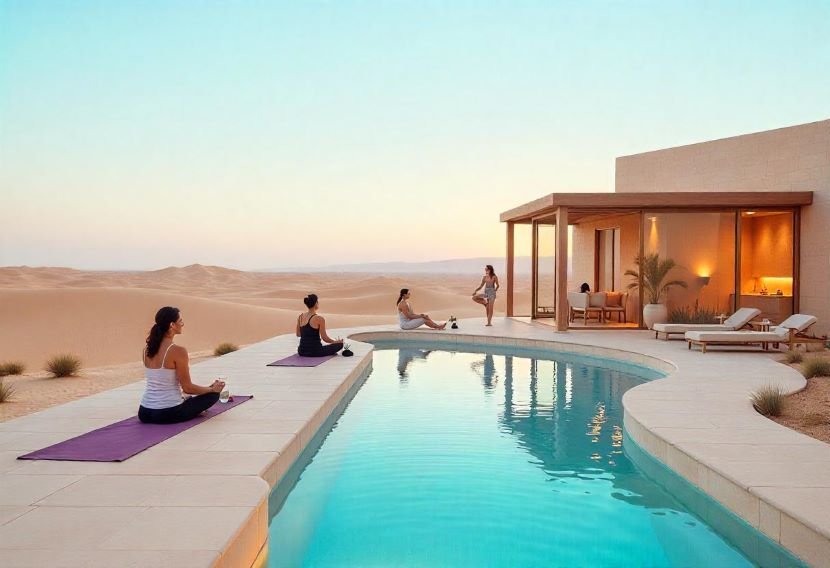Wellness Travel
Alba Wellness Valley recognized in Travel + Leisure Luxury Awards

Alba Wellness Valley by Fusion was named one of Vietnam’s “Best Upcountry Hotels” at the Travel + Leisure Luxury Awards Asia Pacific 2025, earning the prestigious recognition for the third consecutive year.
Nestled in the tranquil foothills of the Truong Son Mountains, just 30km from Hue’s city center, Alba Wellness Valley by Fusion is a wellness sanctuary built around a natural hot spring that is rich with healing and therapeutic properties. With its signature eight-step Japanese onsen, lush 50-hectare grounds and daily schedules of wellness rituals, the resort continues to define luxury through balance and authenticity.
“This honor reflects the unwavering dedication of our team to creating experiences that nurture the body, mind and spirit,” said General Manager Eugene Hendriks. “To be acknowledged by such a respected global travel authority for three years in a row is truly humbling.”
The award was presented at a ceremony in Bangkok on June 18.
Beyond its award-winning onsen and spa services, the resort offers yoga, tai chi, walking meditation and seasonal wellness retreats guided by experts from around the world. All-inclusive wellness packages include Fusion’s signature “breakfast anytime, anywhere,” and holistic treatments that incorporate local herbs and traditions.
Resort guests enjoy farm-to-table cuisine, featuring organic vegetables, herbs, cage-free eggs and poultry sourced directly from the resort’s own certified farm. Cooking classes at the farm offer guests hands-on experiences in local gastronomy.
Sustainability is at the heart of Alba Wellness Valley by Fusion’s philosophy. From sourcing local artisanal products such as essential oils, ceramic crafts and Hue’s famed ginger candies, to replanting fallen trees and recycling them into useful items like coasters and coffee trays, every detail is intentional. The resort holds a Level 1 Green Destination and Good Travel Seal, an international recognition of its eco-conscious practices.
In a fast-evolving wellness landscape, the resort has also continued to pioneer innovation. The resort spans 50 hectares of preserved nature, with the renowned Thanh Tan natural hot spring flowing through the heart of the property. Guests are invited to detox and reset through the resort’s signature eight-step onsen journey, inspired by traditional Japanese bathing rituals. To further deepen personal transformation, Alba offers a wide range of evolving movement therapies, mindfulness activities and cultural storytelling sessions such as “A Walk in the Park” – where guests reconnect with nature through folk tales and botanical exploration.
Alba Wellness Valley by Fusion’s recognition reinforces its position as a leading wellness destination in Asia, one that champions sustainability, connection to nature and restorative travel.
Wellness Travel
Agritourism and Regenerative Farming Are the Latest Wellness Travel Trends

A growing number of travelers are starting to ask the same questions around work and wellness—and finding their answers in the soil. Farm hospitality, a modern evolution of agritourism where beauty, design, and land stewardship merge, suddenly feels more relevant than ever.
“Travelers are looking for meaning,” says Isaac French, founder of Experiential Hospitality. “They want to slow down and experience something real, especially in a screen-saturated and overstimulated world. Regenerative farming represents quite possibly the single biggest setting for that experience and transformation.”
Perhaps that’s why the modern agritourism market is in full bloom, growing 12% yearly and poised to reach $14.5 billion by 2029. A constellation of forces—including piqued curiosity in regenerative agriculture, an evolving definition of well-being, and a hunger for IRL connections—is cultivating the fertile ground for its rise.
“One of the components of wellness is a sense of being grounded. There, nature can help a little,” reflects Karen Roos, owner and visionary behind Babylonstoren in South Africa and The Newt in England, two estates that have set the bar for the new wave. “Our guests love grounding themselves on a working farm.”
A new era of wellness tourism
No doubt it’s the dual promise of freedom and connection that’s driving wellness tourism as it skyrockets towards becoming a $1.35 trillion market by 2028. When combined with a rising interest in experiential travel, which is expected to top $3.1 trillion by 2025, there seems to be a longing for nature-based escapes. According to Spa Business, 79% of wellness travelers seek outdoor immersion, 75% prioritize healthy cuisine, and 60% demand tranquility.
At their best, farm hotels cover all the bases. They’re not just a stay on a farm—they’re places where guests can interact with and immerse themselves in their surroundings. “People are craving experiences that feel real, where there’s a sense of purpose behind the beauty,” says Mary Celeste Beall, proprietor of Blackberry Farm in Tennessee.
Indeed, science confirms that even 10 minutes outdoors can measurably lower cortisol levels and blood pressure. Other research suggests that the sheer beauty of natural landscapes can amplify these effects, calming the nervous system, and lifting the spirit. A weekend on the farm may actually recalibrate guests’ inner landscapes on a cellular and hormonal level.
Wellness Travel
Now, How the Gulf is Poised to Become a Global Wellness Travel Hub: Here is Everything You Need to Know About It

Monday, July 21, 2025
The travel business is changing fast. Now, in a world once dominated by leisure, sightseeing, and business travel, a new force is shaping tourism — wellness tourism. This has caused a major change in the way people see the value of travel. The Gulf, due to its strategic investments and great natural beauty, is in a great position to take advantage of this growing worldwide trend.
A Fast-Growing Global Market
Wellness tourism is already worth $651bn in 2022 and is projected to more than double to $1.4tn by 2027, representing a CAGR of 16.6%, according to the Global Wellness Institute. This change is not a fad but a fundamental change in how travelers are finding balance, restoration, and meaning in their travels.
Wellness travel can mean a lot more than spa trips or a retreat for a detox. It’s a growing space around the intersection of travel and self care. People aren’t just looking for a vacation, they’re looking for ways to heal from it all — physically, mentally, emotionally. Whether a biohacking clinic in Switzerland or a silent meditation retreat in Bhutan or wellness retreats in the beaches of Oman, the modern day wellness traveller varies widely in their needs and motivations.
There are a variety of reasons for the increase in demand for such experiences. The psychological toll of the Covid-19 pandemic has inspired a reevaluation of priorities for many, with a new premium placed on well-being. And travel-obsessed Millennials and Gen Z-ers, drivers of the global tourism economy, care more about mind-body balance than their forebears. Growing digitization has facilitated access to personalized wellness experiences making it easier than ever for travelers, and this is fuelling growth.
A Case for Gulf as a Wellness Tourism Hotspot
The GCC, in particular Saudi Arabia, the UAE and Oman, is in a unique position to lead the global wellness tourism business. With its sophisticated hospitality facilities, they are not only targeting luxury travelers, but also promoting wellness as an important growth sector.
Destinations such as AlUla in Saudi Arabia, the Hatta Mountains in the UAE, and Oman’s Dhofar coast present natural surroundings that are perfect for immersive wellness programmes. They have serene landscapes, centuries-old ruins and crystal-clean beaches for light yoga, meditation and nature therapies. The Gulf, with its superior air links and range of hospitality products, also has the potential to be the wellness tourism centre of the world.
But tapping this opportunity will take more than fancy resorts. Successful wellness tourism investment projects must have a holistic view. Which means joining the dots when it comes to cross-category collaboration between tourism boards, health companies, tech firms and providers of hospitality services to develop seamless offers from start to finish.
Wellness Tourism – The Comfort Of Being Known, Personalization is Everything
With the advent and ongoing proliferation of wellness tourism, personalization has emerged as a top priority. Travelers will be anticipating experiences customized to their biometric readings, lifestyle tendencies and cultural background. Wellness can no longer be one-size-fits-all. Different travellers will have different requirements, be they emotional recuperation, physical rejuvenation or mental fortitude.
This requirement represents personalization, and it implies technology will have a large part to play. Health solutions based on data will also be critical to give travelers the personalized programs that fit their unique requirements. From specialized fitness plans to dietary guidelines determined by one’s genetic markers, the future of wellness travel is getting more personalized.
Credibility and Standards in Wellness Tourism
Along with the health tourism industry, issues increasingly are being raised by consumers as well as regulators. Governments and operators will need to make sure claims about wellness are evidence-based and standards are high. Wellness should not be a meaningless marketing ploy but a real service that can be shown to provide real benefits.
The Workforce Behind Wellness Tourism
Another consideration is the staff necessitated to support wellness tourism. This is a new industry, in need of new professionals — like holistic health practitioners, mindfulness coaches and traditional medicine therapists. In order to address this need, Gulf nations need to invest in the training and accreditation of professionals to secure their credentials, and compensate them sufficiently to be able to deliver quality services.
A Lucrative Investment Opportunity
When you consider the investment potential, wellness tourism is huge. Wellness travelers spend 35-45% more than the average tourist, according to research. Furthermore, wellness tourism is low volume, high margin and much less seasonally sensitive, which means that in relation to other forms of investment it’s more appealing for developers, sovereign wealth and private equity investors.
Matching Wellness Travel with ESG Objectives
The increasing demand for wellness tourism also dovetails into the broader trend for ESG (Environmental, Social, Governance)-dedicated investments around the world. Environmentally sustainable wellness resorts, nature-based retreats and culturally indigenous healing traditions offer strong financial returns, while also adding value to local communities and the environment. “As investors are searching more for purpose-driven assets, wellness tourism offers a unique opportunity to add value to local communities while being profitable,” said Susie Ellis, the leader of the research team that carried out the study.
Wellness Travel, Post-Pandemic, in the Gulf
In a fractured, uncertain world, travelers are seeking a sense of purpose and equilibrium. Wellness tourism is a manifestation of a larger societal need to connect and take care of ourselves. For the Gulf, it’s an opening to steer the global conversation on purposeful travel in the 21st century.
As the Gulf invests in wellness, it is not only staking out its share of economic value, it is also stamping its mark on a nascent global wellness tourism industry. The destinations that truly embrace this change, grounded in authenticity, with strategic investment and at systems level, will become magnets not just for tourists, but also for the building of ecosystems of health, resilience and renewal. It will also enable the region to become the worlds wellness capital.
Source Credit: www.thenationalnews.com
Wellness Travel
How the Gulf could emerge as a global hub for wellness travel
The travel industry is undergoing a profound transformation. What was once a sector dominated by leisure, sightseeing and business conferences is now being reshaped by a more purposeful motivation: wellness.
According to the Global Wellness Institute, wellness tourism is set to more than double in value from $651 billion in 2022 to a projected $1.4 trillion by 2027, growing at a compound annual rate of 16.6 per cent. This is not a passing fad – it is a structural shift that signals how we, as a society, are redefining the value of travel.
At its core, wellness tourism is the intersection of travel and self-care. It spans far more than detox retreats or luxury spa getaways. Today’s wellness-seeking traveller is just as likely to be on a silent meditation retreat in Bhutan, as attending a biohacking clinic in Switzerland or participating in a movement-based therapy programme on the beaches of Oman. The motivations are varied and include mental resilience, physical renewal as well as emotional healing – but the economic impact is universally clear: wellness is now a defining force in global tourism.
This trend has been accelerated by several macro forces. First, the long tail of the Covid-19 pandemic has left a deep psychological imprint. The isolation, disruption and stress of those years have triggered a mass re-evaluation of lifestyle choices. Consumers are now allocating time and money towards experiences that offer restoration – not just recreation.
Second, demographic shifts are at play. Millennial and Gen Z travellers, who now form the bulk of global travel demand, prioritise holistic well-being as a central part of their identity. This is the first generation for whom vacationing and healing are not mutually exclusive. Finally, digitalisation has enabled travellers to discover, plan and access highly personalised wellness experiences at scale.
The Middle East, and the Gulf in particular, is uniquely positioned to benefit from this surge.
The region has invested heavily in high-end hospitality infrastructure, but until recently, much of this was aimed at luxury leisure and business travel. The wellness economy presents a compelling adjacent growth opportunity. Destinations like AlUla in Saudi Arabia, the Hatta Mountains in the UAE and Oman’s Dhofar coast offer natural settings that are ideally suited for immersive wellness experiences. Coupled with strong air connectivity, an increasingly diversified hospitality sector and supportive policy environments, the Gulf could emerge as a global hub for wellness travel.
But capturing this opportunity will require more than beautiful resorts and Instagrammable yoga decks. The winners in this space will be those who take a systems-level view.
First, cross-sector collaboration is key – linking tourism boards, healthcare providers, tech firms and the hospitality sector to create integrated offerings. Second, data and personalisation will be critical. Wellness is not a one-size-fits-all proposition. Travellers expect experiences tailored to their biometric data, lifestyle habits and cultural context. Third, credibility matters. As wellness tourism grows, so too does scrutiny. Governments and operators must ensure that standards are rigorous, claims are evidence-based and that wellness does not become an empty marketing slogan.
At its core, wellness tourism is the intersection of travel and self-care
There are also implications for the workforce. Wellness tourism demands a new breed of professionals – holistic health practitioners, mindfulness coaches, fitness experts and traditional medicine therapists – all of whom must be trained, accredited and fairly compensated. This presents an opportunity for regional economies to invest in human capital, diversify employment and foster innovation within the broader health and hospitality ecosystem.
From an investor’s perspective, the sector’s performance is increasingly compelling. Studies have shown that wellness travellers typically spend 35-45 per cent more than the average international tourist. And unlike mass-market tourism, wellness offerings tend to be high-margin, low-volume and less seasonally volatile – an attractive proposition for developers, sovereign wealth funds and private equity alike.
What’s more, wellness tourism aligns closely with the rising demand for ESG-aligned investments. Sustainable resort developments, nature-based retreats and culturally rooted healing traditions offer not only strong financial returns but also measurable social impact. As institutional investors look to diversify their portfolios with purpose-driven assets, wellness tourism presents a rare confluence of profitability, resilience and long-term relevance.
In a fragmented and volatile world, people are searching for meaning, balance and connection. Wellness tourism is not just a product category; it is a reflection of deeper societal desires. For the Gulf, this is a chance not only to capture economic value but to shape the global narrative around what purposeful travel looks like in the 21st century.
The destinations that embrace this shift – with authenticity, strategy and bold investment – won’t just attract travellers. They will build ecosystems of health, resilience and renewal that transcend tourism altogether.
-

 Brand Stories3 hours ago
Brand Stories3 hours agoBloom Hotels: A Modern Vision of Hospitality Redefining Travel
-

 Brand Stories3 hours ago
Brand Stories3 hours agoHow Olive Group of Hotels Is Redefining Wellness Travel in India—And Why the World Is Watching
-

 Destinations & Things To Do23 hours ago
Destinations & Things To Do23 hours agoUntouched Destinations: Stunning Hidden Gems You Must Visit
-

 AI in Travel22 hours ago
AI in Travel22 hours agoAI Travel Revolution: Must-Have Guide to the Best Experience
-

 Brand Stories1 week ago
Brand Stories1 week agoHow Elon Musk’s rogue Grok chatbot became a cautionary AI tale
-

 Brand Stories2 weeks ago
Brand Stories2 weeks agoVoice AI Startup ElevenLabs Plans to Add Hubs Around the World
-

 Asia Travel Pulse2 weeks ago
Asia Travel Pulse2 weeks agoLooking For Adventure In Asia? Here Are 7 Epic Destinations You Need To Experience At Least Once – Zee News
-

 AI in Travel2 weeks ago
AI in Travel2 weeks ago‘Will AI take my job?’ A trip to a Beijing fortune-telling bar to see what lies ahead | China
-

 Brand Stories2 weeks ago
Brand Stories2 weeks agoChatGPT — the last of the great romantics
-

 The Travel Revolution of Our Era1 month ago
The Travel Revolution of Our Era1 month agoCheQin.ai Redefines Hotel Booking with Zero-Commission Model

You must be logged in to post a comment Login